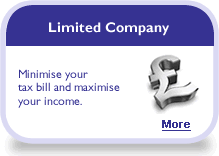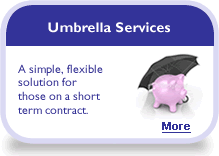Umbrella Companies
Since the Managed Service Company Legislation was introduced in the 2007 budget, there is only one choice for an umbrella company, and that is the PAYE umbrella. An umbrella company is an established single management company that allows a number of contractors to work under its name. Essentially umbrella companies offer an outsourced payroll service. A contractor receives their contract income less tax, NI contributions and the Umbrella services fee. You will receive a payslip from your umbrella company in the way same as a permanent employee would. The contractor is not a director or shareholder of the company and is not legally responsible for the administration and the payment of company taxes. This avoids the responsibilities associated with running a limited company or being self-employed. By using the services of an umbrella company, it also means that there are no IR35 issues, as using a PAYE umbrella means that your income will be treated as though you are an employee.
The advantage of umbrella services is that the reduced paperwork and simplicity of use make it an easy option if you only intend to contract for a short period or if a contractor considers that he is caught by IR35.
The disadvantages of using an umbrella service is that it is a lot less tax efficient than contracting through your own limited and will very significantly reduce take home income.
By claiming all appropriate allowances and expenses you can make some tax savings and reduce your tax bill; however, this is not a way of avoiding tax. Some umbrella companies will inflate net income by abusing of 'HMRC approved expenses schemes' and 'dispensations'. Note that any incorrectly paid expenses will be recovered from the employee and not the umbrella company. Receipts should be kept for all the expenses that you claim. You need to keep in mind that it is you that HM Revenue &Customs will investigate and not your umbrella company and you aught to be very cautious of companies who say you do not need to keep receipts or that you can claim for expenses that have not actually been incurred.
Expenses can only be claimed if they are “wholly, exclusively and necessarily incurred for purposes of carrying out the work for the contract in hand. The following is a list of typical expenses that may be claimed;
Travel
You can claim the cost of travel to and from your temporary place of work. If you use your car to travel to or between places of work you can claim a mileage allowance. The rates are 45p per mile for the first 10,000 miles in any year [fiscal year from 6 April to 5 April ] and then 25p per mile thereafter. If you carry passengers with you in the same vehicle you can also claim a passenger allowance. If you travel with two or more people from the same business, the driver can claim an additional 5p per mile passenger rate for each qualifying passenger. So, for example if 5 of you travel together, the driver can claim 65p per mile (45p for the driver plus 4 x 5p per mile for each passenger). To qualify, each of the passengers must be employed by, or be an officer of the business. The passenger allowance cannot be claimed by the passenger. This allowance is to cover fuel and running costs of the vehicle. You can also claim for parking and congestion charges but you may not claim for parking or speeding fines. A mileage allowance can also be claimed for travel by motorcycle and bicycle at rates of 24p per mile and 20p per mile respectively.
The cost of travel by public transport can also be claimed but you must have a valid receipt or proof of expenditure.
Food and drink and lunch claims
Despite what you may have read or heard you cannot claim for the cost of lunches taken as part of your normal working day as this is not an expense incurred 'wholly and exclusively for business purpose ' since everyone must eat in order to live, whether they are a contractor or permanent employee. HM Revenue &Customs published brief 24/09, introduced an advisory system of benchmark subsistence scale rates which can be claimed where the employees who incurs extra substance expense as a result of allowable business travel to a temporary workplace. This publication has often been misinterpreted and consequently has added to the confusion. Strict conditions must be met to use the benchmark rates. In a nutshell you can only use the benchmark scale rates to claim the cost of a meal if it is taken as a result of your business travel to a temporary workplace, is an extra expense attributable to that travel and you have a receipt in respect of the expense claimed.
Accommodation &Subsistance
The cost of hotel or bed and breakfast accommodation can be claimed as an expense as can the reasonable cost of additional meals taken in conjunction with overnight accommodation where a contractor is required to work away from home. There are no set allowances for accommodation but the cost must be deemed to be 'reasonable'; this also applies to the cost of meals.
Equipment
Claims for equipment must be supported by evidence that they are specifically required for your current contract and that the equipment is wholly necessary for you to perform the assignment. Any general pieces of equipment for your role as a contractor or 'nice to haves' are not permitted by the Inland Revenue.
Clothing
The cost of specialist protective clothing that is worn to protect your everyday clothes can be claimed as an expense. Clothing required for the performance of your contract that could not reasonably worn outside of work can also be claimed. You cannot claim for ordinary clothing which would form part of an 'every day' wardrobe even if you would not be likely to wear your working clothes anywhere other than at work. You also cannot claim for the costs dry-cleaning or alterations.
Training
According to HMR&C legislation, an expense cannot be deducted under the general rule for employees' expenses in Section 336 ITEPA 2003 unless it is incurred "in the performance of the duties of the office or employment". This means that the training course must be wholly and totally relevant to the performance of your duties under your existing contract. It is not enough for the expense to be relevant to the job, or to be incurred in connection with the duties of the job.
Eye Tests
If you are required to use a computer as part of your everyday duties you can claim the cost of an eye test. If it can be proven that you also will need glasses or contact lenses purely for the work undertaken at the computer then this cost can also be claimed.
Subscriptions
The Inland Revenue will permit you to claim, as an expense, the cost of fees and subscriptions paid to professional bodies or learned societies.
Pensions
Pensions represent one of the few remaining tax breaks available to contractors. You can invest part of your income into our pension scheme and we process this as a tax benefit for you. You save not only the income tax that would ordinarily but due also save employers and employees national insurance contributions. Through Contractor Umbrella's pension scheme, the amount of tax relief can be as much as 54% meaning that for each £100 invested you pay from as little as £46.20 and the tax man pays the rest.
Click Here to find out about our umbrella service















